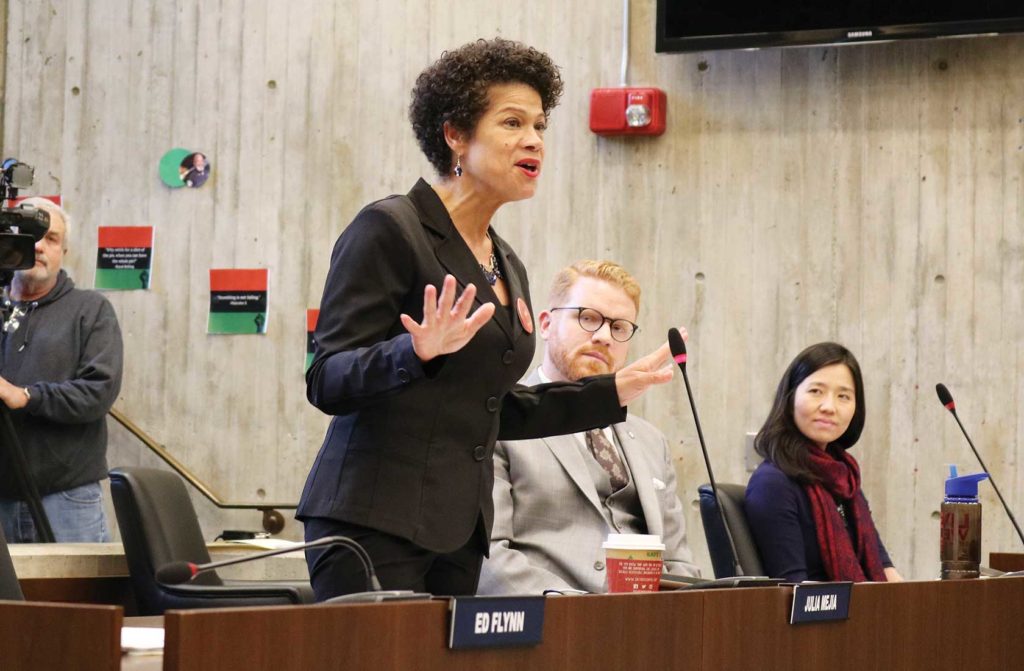
Researchers predict that the COVID-19 pandemic could reach a peak in Massachusetts within the next week. Current totals for Massachusetts as of April 9 were 18,941 confirmed cases and 503 deaths. As hospitals prepare for an oncoming surge, Boston city councilors are devising new ways to protect city residents.
The pandemic has exacerbated food insecurity for low-income residents across the city. Financial stress, fear and citywide mandates have prevented some families from accessing food.
“Before the COVID-19 outbreak, 1-in-11 families in Massachusetts did not have enough food to feed themselves,” said City Councilor Julia Mejia in Wednesday’s council meeting. “While 61% of these families live in poverty, 34% are working class, meaning that they make too much money to qualify for governmental assistance, but make too little money to adequately feed themselves.”
Some families must travel long distances to get food, she noted, risking exposure on public transit or on the streets.
“This is dangerous, and it is unfair — that in times of crisis we tell poor people to just suck it up and take what they can,” said Mejia.
Councilor Liz Breadon said that the low-income elderly population, including immigrant elders, are experiencing these food shortages.
“They are frequent visitors to our food pantries historically, but in this crisis, they’re finding it increasingly difficult to access a food pantry,” she said.
One solution, noted the councilors, could be an accessible food delivery system. Mejia urged the city to take action.
“I think more needs to be done a lot sooner, so that we can keep our people alive,” she said.
Boston’s homeless population, too, is especially vulnerable. Families are taking refuge in shelters, despite the availability and abundance of empty units in the area. Councilor Kenzie Bok urged property owners to rent out their vacant apartments to protect these vulnerable individuals.
“We have 500 families right now in shelter with housing vouchers who have not found permanent housing,” said Bok. “It’s a public health emergency for them.”
Some of the vacant units are newly available, as college students across the city have returned home due to protective mandates.
Boston has 500 vacant suitable units that are sitting in the housing stock, said Bok. Housing these families, she said, is an important act of human solidarity.
“This COVID-19 crisis has really put a spotlight on all the weaknesses and injustices of our society,” said Bok. “I think one thing it has shown us — which we already knew — is everyone needs a home to be safe.”
Councilor Lydia Edwards noted that many voucher-holders seeking housing face an “unfortunate stigma” that they are less-than or not ideal tenants.
Councilor Michelle Wu also acknowledged the importance of keeping people in their homes. She said that the City Council does not have the ability to issue a rent moratorium, but it can provide relief in other ways, for instance to small businesses struggling to pay rent.
“What we do have the authority to accomplish at the city level is to issue rent relief for city-owned and BPDA-owned buildings,” Wu said. These buildings include historic sites like Faneuil Hall.
“We know that there are several amazing community small businesses in there that are struggling right now, that may or may not be able to survive economically this pandemic, and to which rent relief would make a big, big difference,” Wu said.
Councilor Ricardo Arroyo agreed. He said that it is incumbent on the Council to be creative about solutions and bring relief to these residents and business owners.
“We’re going to see more and more businesses and more and more residents struggling to afford to stay where they are,” he said.
Wu noted that property taxes are a tremendous burden to residents and businesses — especially now. She ordered a hearing regarding property tax deferral: “Let’s evaluate what it looks like if the City of Boston were to help support and stabilize our community members who are really struggling with staying in their spaces,” she said.
In the wake of this crisis, Mejia urged people to reconsider using a “deficit lens” when addressing low-income communities. She said that too many conversations focus on what these communities lack.
“We are not as hopeless or as helpless as people have been led to believe,” she said, adding that the city has an ability to “shift the narrative.”
Other resolutions at the April 8 meeting included Council President Kim Janey advocating for the protection of university workers who have been laid off.
Councilor Andrea Campbell urged Boston to create a mental health fund, as the pandemic’s impact has affected the mental health of many residents. Many are facing severe depression or anxiety throughout the crisis, and isolation also leads to higher rates of domestic violence.
Another grim reality is that communities of color and low-income residents are especially impacted by COVID-19, Campbell said. She referenced a Kaiser Family Foundation poll, published April 2, which found that 42% of all adults, and 53% of women, said that the crisis has affected their mental health. Nearly 20% said that it’s made a major impact — and Campbell said that this impact is higher for black and Latino individuals.
All of this adds up to an unknowable future, but it’s clear that much assistance will be needed.
“The scope of where relief will be needed is beyond what we know right now,” Campbell said.






